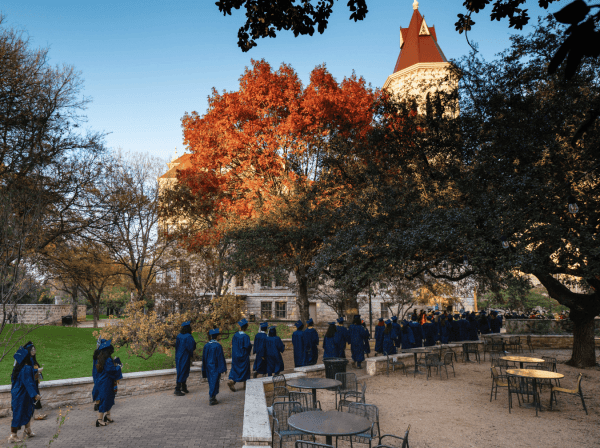Professor Bill Quinn Does It All
When asked what he does in his downtime, Bill Quinn, the longtime St. Edward’s biology professor and winner of the university’s 2015 Distinguished Teaching Career Award is flummoxed. “Um ... do writing reports and managing papers count?” he asks.
Then he spots a familiar face as he walks through Ragsdale Plaza. “Hey, Jen Wichman,” he calls out, “What do I like to do when I’m not teaching?” His former student (and now the university’s associate dean of students) yells back, “Take your class out to dinner!”

“Man, I don’t do that nearly often enough,” he says. Taking students out is a rarity these days because Quinn divides his time among many activities: teaching, advising, mentoring student researchers and conducting his own research, to name a few. Over the course of his three decades at St. Edward’s, he’s led field research from Colorado to Panama. Closer to home, he and his students have studied soil respiration in the alkaline clay of Central Texas, the population structure of Jollyville Plateau salamanders in northwest Austin, the effects of fire on plant associations in the Hill Country, watershed quality in Barton Creek, and more. He has also been involved in community service as a part of the city’s Oak Wilt Task Force Technical Advisory Committee, the Treaty Oak Task Force and the Walnut Creek Task Force Advisory Committee.
He has published in ecological journals, written technical papers for the U.S. Forest Service, co-presented with scores of students at professional meetings, chaired the Biology program, and taught general education courses to hundreds of undergraduates. “I’m fortunate to have landed here — I haven’t had 10 boring minutes in the last 33 years. The university has changed, our teaching methods change, and the science and technology are constantly changing,” he says. “I worry about how to stay current and relevant. But I’m fortunate to be surrounded by bright people who are fantastic teachers and who share a drive to learn. We figure it out together.”
Collaboration is a philosophy that works with Quinn’s students, too. “One of the joys of my job is mentoring student researchers. I teach them to identify problems, come up with hypotheses and test them. The students don’t sit in on my research; they do their own,” says Quinn, who is a fellow and past president of the Texas Academy of Science. “I’m a botanist and an ecologist, but I’m constantly redirecting my expertise and getting up to speed on their topics. I’m always learning, even as their mentor.”
The scientific process is not without its challenges, says Quinn, and part of his job is helping students handle setbacks. “Over the years, I’ve learned that giving students direct, quick feedback and close one-on-one support works best for heading off frustration and keeping students engaged,” he says. “I don’t tell them what to do or how. I remind them that this is real science, so often times, I don’t know what’s going to happen either.”

Studying those mysteries has yet to lose its thrill. Quinn loves traveling to new places — the gallery forests of Panama, the Platte River of Nebraska, the bush of southern Africa, the botany (and related cuisine) in Angers, France, and “anywhere and everywhere in Colorado” — to study diverse and dynamic ecosystems. “I got interested in ecology while growing up in the suburbs of Houston, playing in the woods, digging stuff up, finding an interesting worm or leaf,” he says. “I was drawn to biology, and ecology in particular, because they’re all about how the whole natural community ticks. Studying and teaching that is a great way to spend a day.”
Regina Lewis and Joseph Chen wanted to honor Professor Bill Quinn’s impact on their children and nephew, so they established the Bill Quinn, Ph.D., Endowed Professorship. The fund will support a biology professor who shares Quinn’s interest in ecology.


